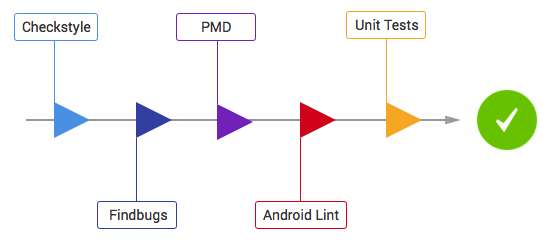Sample Android app that we use at ribot as a reference for new Android projects. It demonstrates the architecture, tools and guidelines that we use when developing for the Android platform (https://github.com/ribot/android-guidelines)
Libraries and tools included:
- Support library 22.2
- RecyclerViews and CardViews
- RxJava and RxAndroid
- Retrofit and OkHttp
- Dagger 2
- SqlBrite
- EasyAdapter
- Butterknife
- [Timber] (https://github.com/JakeWharton/timber)
- Picasso
- Otto event bus
- Functional tests with Espresso
- Unit tests with Robolectric
- Mockito
- Checkstyle, PMD and Findbugs for code analysis
- Android SDK.
- Android 5.1 (API 22) .
- Android SDK Tools
- Android SDK Build tools 22.0.1
- Android Support Repository
This project follows our Android architecture guidelines. Read more about them here.

This project integrates a combination of unit tests, functional test and code analysis tools.
To run unit tests on your machine:
./gradlew test
To run functional tests on connected devices:
./gradlew connectedAndroidTest
Note: For Android Studio to use syntax highlighting for Automated tests and Unit tests you must switch the Build Variant to the desired mode.
The following code analysis tools are set up on this project:
- PMD: It finds common programming flaws like unused variables, empty catch blocks, unnecessary object creation, and so forth. See this project's PMD ruleset.
./gradlew pmd
- Findbugs: This tool uses static analysis to find bugs in Java code. Unlike PMD, it uses compiled Java bytecode instead of source code.
./gradlew findbugs
- Checkstyle: It ensures that the code style follows our Android code guidelines. See our checkstyle config file.
./gradlew checkstyle
To ensure that your code is valid and stable use check:
./gradlew check
This will run all the code analysis tools and unit tests in the following order:
The project can be distributed using either Crashlytics or the Google Play Store.
To do this, set up a local variable $ANDROID_DISTRIBUTION to any of the following values:
play-production
play-alpha
play-beta
crashlytics-yourgroupname
crashlytics-yourgroupname2
etc
Then use the following command e.g. on your CI server:
./gradlew clean check connectedAndroidTest assembleRelease $(if [[ $ANDROID_DISTRIBUTION == crashlytics-* ]]; then echo crashlyticsUploadDistributionRelease; else echo publishApkRelease; fi )
To quickly start a new project from this boilerplate follow the next steps:
- Download this repository as a zip.
- Change the package name.
- Rename packages in main, androidTest and test using Android Studio.
- In
app/build.gradlefile,packageNameandtestInstrumentationRunner. - In
src/main/AndroidManifest.xmlandsrc/debug/AndroidManifest.xml.
- Create a new git repository, see GitHub tutorial.
- Replace the example code with your app code following the same architecture.
- In
app/build.gradleadd the signing config to enable release versions. - Add Fabric API key and secret to fabric.properties and uncomment Fabric plugin set up in
app/build.gradle - Update
proguard-rules.proto keep models (see TODO in file) and add extra rules to file if needed. - Update README with information relevant to the new project.
